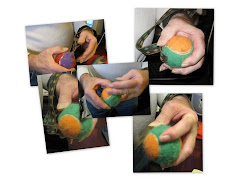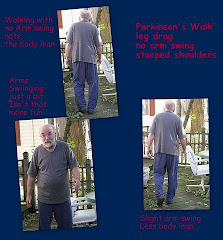Parkinson's disease is different things to different people, sort of
 like the old one about the blind men and the elephant. Some of us follow doctor's instructions to the letter while others, myself included, are constantly stirring the mix to find something that not only slows the progression but also appears to reverse symptoms.
like the old one about the blind men and the elephant. Some of us follow doctor's instructions to the letter while others, myself included, are constantly stirring the mix to find something that not only slows the progression but also appears to reverse symptoms.So I tried creatine (see: Creatine note below) again, only this round I am pairing it with the CoQ10 doses which I already take. I'm trying to take smaller amounts of CoQ10 but more often throughout the day as apparently it has some diminishing returns in large doses. To that mix I just added St John's Wort (standardized hypericum 0.3%) with an enzyme delivery system.
 I tried the CoQ10-Creatine combination first but I am impatient and wasn't sure I felt any results. So I added St John's Wort a couple of days ago. Yes, we did read about the "cheese effect" for tyramine and St John's Wort but for now I'm operating under the FDA opinion that MAO-B and MAO-A really are different in effect. (And subsequent to this post, the cheese warning was removed by the FDA from Azilect, my MAO-B inhibitor)
I tried the CoQ10-Creatine combination first but I am impatient and wasn't sure I felt any results. So I added St John's Wort a couple of days ago. Yes, we did read about the "cheese effect" for tyramine and St John's Wort but for now I'm operating under the FDA opinion that MAO-B and MAO-A really are different in effect. (And subsequent to this post, the cheese warning was removed by the FDA from Azilect, my MAO-B inhibitor)Although it has only been a few days, I think that I am less stiff; I can see and feel it in my left hand. That's my PD side. When we're driving somewhere, that's the hand my wife takes when she notices it is looking
 claw-like and separates the fingers, strokes and presses them down on my thigh. She's trying to make me aware of those muscles in a nice way. Sometimes she encourages me to do finger-stretching exercises in the car. Now that I have added St John's Wort to the mix, there seems to be less tension in that hand.
claw-like and separates the fingers, strokes and presses them down on my thigh. She's trying to make me aware of those muscles in a nice way. Sometimes she encourages me to do finger-stretching exercises in the car. Now that I have added St John's Wort to the mix, there seems to be less tension in that hand.Do I think this change is due to the addition of St John's Wort, not really. It takes a minimum of a week to six weeks for this herb to be effective, the average is about a month. Plus the fact that I began at 600 mgs a day and not 900 mgs will also delay the onset of effectiveness...if any...No, I credit the change to the addition of creatine.
Creatine was named by French chemist Michal-Eugene Chevreul in 1832 while working as professor of chemistry specializing in the study of fatty acids at the Musee d'Histoire Naturelle. It was here that he isolated creatine as a component of skeletal muscle by extracting it from meat (muscle tissue). Twelve years later, a German scientist Justus von Liebug noticed that wild foxes (those who hunt for survival) had more intramuscular creatine than captive foxes who expended little energy to obtain food or escape predators. This has interesting implications in Parkinson's where the majority of patients appear to come from a more sedentary lifestyle.
So what do we know about creatine and CoQ10?
We know that CoQ10 is an important antioxidant because of its ability to transfer electrons. We know that the mitochondria within the cell need both CoQ10 and creatine to produce cellular energy because they function in different ways to assist that process. We also know that Parkinson's disease can be viewed as a mitochondrial disorder with decreased production of ATP (adenosine triphosphate) which has been called "molecular currency" and "the energy currency of life" without which muscles will not contract.
More than one study has pointed out the neuroprotective effects of the combination of adding creatine and CoQ10 to fight against dopamine depletion and the loss of tyroine hydroxalase neurons in the substantia nigra. In addition the addition of creatine and CoQ10 demonstrated a reduction of Lipid peroxidation - significant because that means a reduction of cell damage. It improved glutathione homeostasis with an overall effect of improving motor performance.
There are other combinations which have been the subject of study. In 2007 there ws an early PD study of CoQ10 and GP-1485, an immunophilin compound. By 2006 Symphony Neuro development Company stopped an open-label study of GP-1485 for regeneration of damaged nerves finding no demonstrated benefit.
A study of minocycline and creatine did demonstrate some benefit for ALS rat models but alone, minocycline alone did not demonstrate improvement in preventing cell death in HD models.
Creatine note: It took several years to find the "right" creatine. At the time this article was written we were still going by trial and mostly error.
In 2010 we discovered that a smaller particle creatine monohydrate was effective in restoring slight arm swing and maintaining some muscle strength.
In 2011 we purchased pharmaceutical grade micronized creatine monohydrate and saw a dramatic change in left arm swing, should engagement (making an improvement in balance as a result) and muscle strength retention.
resources and additional reading:
Beneficial effects of creatine, COQ10, and lipoic acid in mitochondrial disorders
Creatine and CoQ10
Combination therapy with coenzyme Q10 and creatine produces additive neuroprotective effects in models of Parkinson's and Huntington's diesases
Beneficial effects of creatine, CoQ10 and lipoic acid in mitochondrial disorders
The Creatine Clinical Trial site at NIH
A randomized clinical trial of coenzyme Q10 and GPI-1485 in early Parkinson disease
From Harvard: Additive Neuroprotective Benefits of Minocycline with Creatine in a Mouse Model of ALS
Results of the above trial on Minocycline with Creatine - 2006
Parkinson's CoDrugs for Levadopa: Caffeic Acid and Carnosine
Creatine: The Power Supplement by Melvin H Williams, PhD; Richard B Kreider,PhD; and J David Branch, PhD is available online
Creatine
Addendum
We recently viewed an online Webinar in which Creatine was mentioned as possibly being neurprotective. We'll add updates as we learn of them.














A study of minocycline and creatine did demonstrate some benefit for ALS rat models but alone, minocycline alone did not demonstrate improvement in preventing cell death in HD models.
ReplyDeleteaminosaure